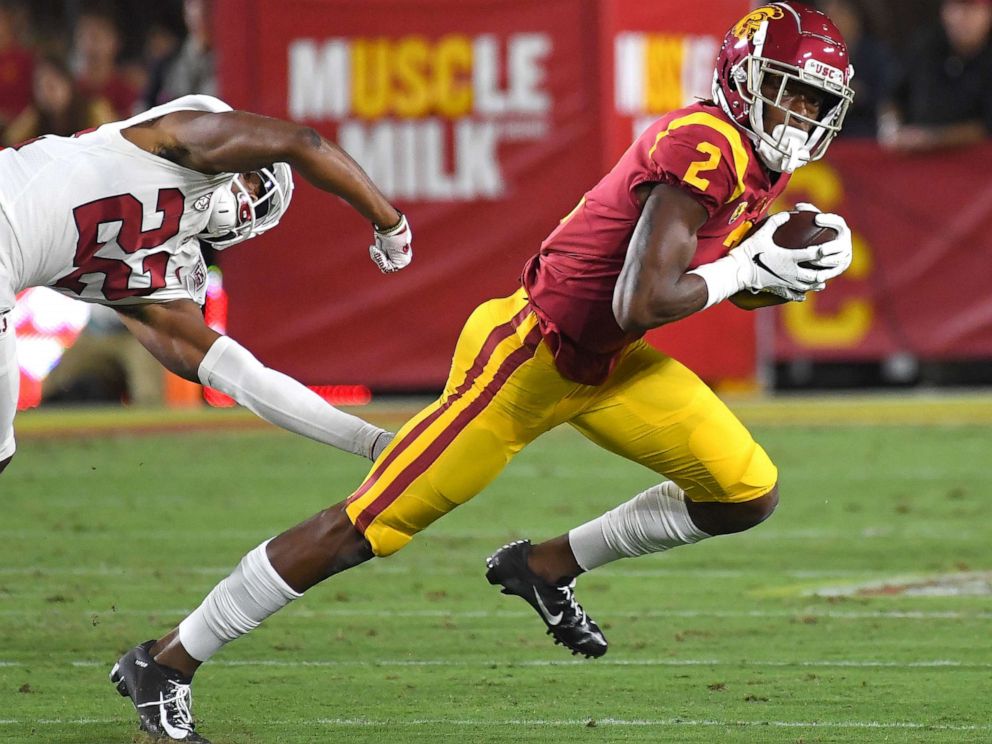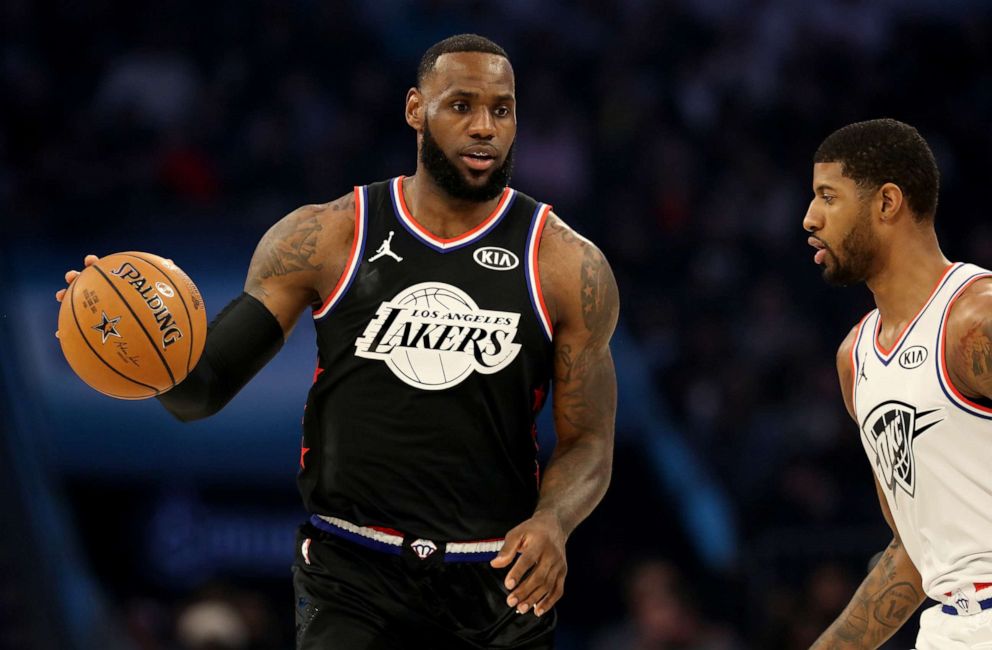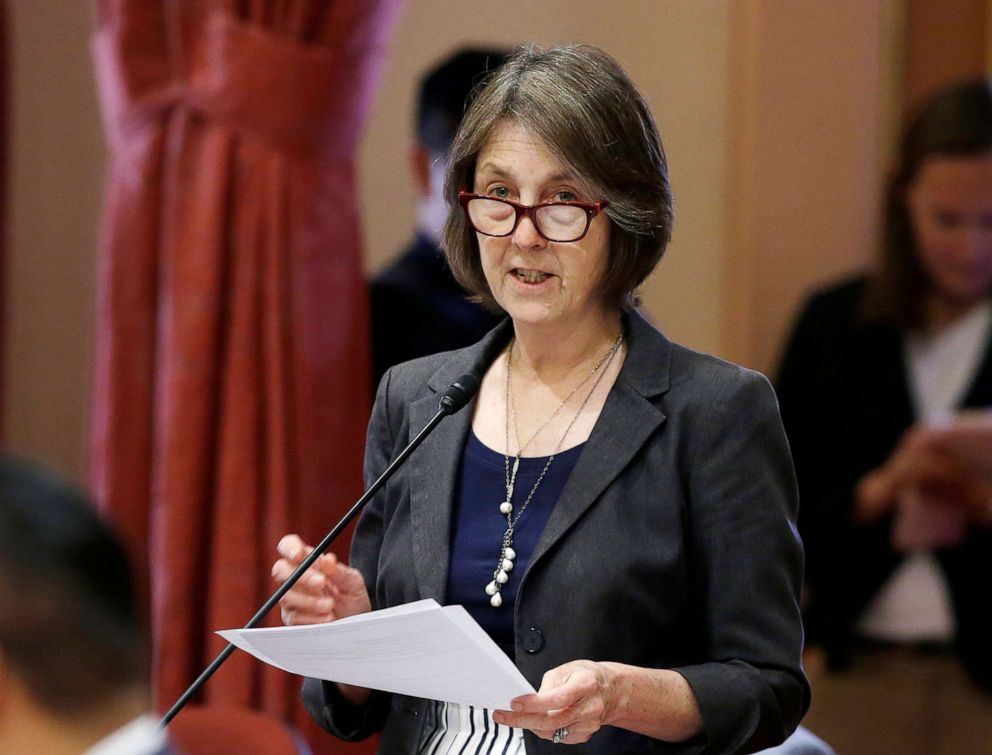California governor signs bill allowing college athletes to profit from endorsements
The California Assembly voted 66-0 to approve the legislation.
California Gov. Gavin Newsom signed into law Monday legislation to allow college athletes to earn income for the first time from their names, images and likenesses.
The California Assembly overwhelmingly passed legislation earlier this year, a move that was praised by NBA star LeBron James.
"Colleges reap billions from student athletes but block them from earning a single dollar. That’s a bankrupt model," Newsom tweeted on Monday morning, announcing he had signed the legislation, making California "the first state to allow student athletes to profit off their name, image, and likeness."
The law, also known as the Fair Pay to Play Act, will prohibit California colleges and universities from enforcing NCAA rules preventing student-athletes from being compensated for the use of their names, images and likenesses and from endorsements and sponsorships.

The state Assembly passed the bill earlier this month in a 73-0 vote. An earlier version was approved by the state Senate on May 22 and the amended bill was passed by the state Senate, sending it to Newsom's desk.
The law will go into effect in 2023.
The Assembly voted on the bill after LeBron James of the Los Angeles Lakers tweeted his support for the legislation.

"California can change the game," James, a frequent critic of the NCAA who went straight to the NBA from high school, said in his tweet.
In a statement released on Monday, NCAA officials predicted the law will create confusion throughout the nation as more states follow in California's footsteps.
"As a membership organization, the NCAA agrees changes are needed to continue to support student-athletes, but improvement needs to happen on a national level through the NCAA’s rules-making process," the NCAA's statement reads. "Unfortunately, this new law already is creating confusion for current and future student-athletes, coaches, administrators and campuses, and not just in California.
"We will consider next steps in California while our members move forward with ongoing efforts to make adjustments to NCAA name, image and likeness rules that are both realistic in modern society and tied to higher education," the statement continues. "As more states consider their own specific legislation related to this topic, it is clear that a patchwork of different laws from different states will make unattainable the goal of providing a fair and level playing field for 1,100 campuses and nearly half a million student-athletes nationwide."
In a letter sent to state Assembly leaders in June, NCAA President Mark Emmert warned that if the legislation became law there could be severe consequences for the state's colleges and universities, including prohibiting athletic teams from participating in NCAA championships.
“We recognize all of the efforts that have been undertaken to develop this bill in the context of complex issues related to the current collegiate model that has been the subject of litigation and much national debate," Emmert wrote in his letter.
"Nonetheless, when contrasted with current NCAA rules, as drafted the bill threatens to alter materially the principles of intercollegiate athletics and create local differences that would make it impossible to host fair national championships," Emmert wrote. "As a result, it likely would have a negative impact on the exact student-athletes it intends to assist."
State Sen. Nancy Skinner, a co-author of the bill, said the proposed law would level the playing field for student-athletes against "unfair rules that exploit college athletes and allow the NCAA, universities, TV networks, and corporate sponsors to pocket huge sums."
She said the rules have "disproportionately harmed students from low-income families," including many who live below the poverty line while attempting to simultaneously fulfill their dreams in the athletic arena and the classroom.

"They’re particularly unfair to female athletes because, for many young women, college is the only time they could earn income since women have fewer professional sports opportunities than men,” Skinner's statement reads.
Hall of Fame basketball player Kareem Abdul Jabbar, maybe the greatest collegiate player of all-time while at UCLA, called athletes being unpaid a "travesty."
"College athletics is a big business and the people who put the people in the seats, they're the football and basketball players," Abdul-Jabbar told ABC News' "Start Here" podcast. "They get nothing. What? Room, board and tuition. That's a joke. The gentleman who runs the NCAA makes several million dollars a year."
"I'm not saying that you have to make college athletes wealthy, but they should have a fair share of the revenue that they are producing," he added.
Golden State Warrior forward Draymond Green, who played at Michigan State, was outspoken in support of the law, arguing that colleges have capitalized off athletes’ talent for too long.
"We have this conglomerate making a killing off unpaid labor," Green told ABC News, noting the bill will protect college athletes and being more equality to the sport. "It’s been time to do away with that."
Listen to Kareem Abdul Jabbar's full interview in the Tuesday, Oct. 1, 2019, episode of ABC News' daily news podcast, "Start Here."
The action taken by California lawmakers appears to be gaining national traction.
In March, U.S. Rep. Mark Walker, R-N.C., proposed the Student-Athlete Equity Act, bipartisan legislation that would remove the restriction on student-athletes using or being compensated for use of their names, images and likenesses.
Some athletes have previously sued the NCAA and video game makers in attempts to get paid for the use of their names and likenesses.
Former UCLA basketball star Ed O'Bannon, who led the school to an NCAA Division I men's basketball championship in 1995, was the lead plaintiff in an antitrust lawsuit that challenged the NCAA's right to use athletes' names, images and likenesses without compensation. O'Bannon claimed his name and image were illegally used in video games years after he graduated and without him ever being compensated.
A judge presiding over O'Bannon's case found in 2014 that amateurism rules for college sports violated federal antitrust law and ruled that student-athletes could be compensated as much as $5,000 annually. But an appeals court struck down the plan to pay student-athletes.
O'Bannon was present at Newsom's signing on Monday.
"I think the most important part of the California legislation is this: It's the fact that LeBron James and other people like LeBron James are supporting it," ESPN's Paul Finebaum, host of the SEC Network's "Paul Finebaum Show," told ABC News. "That trickles down. That resonates with young athletes, who look up to LeBron James, who who look up to him as as a role model, as a hero, much more than they would look up to someone like Mark Emmert."




